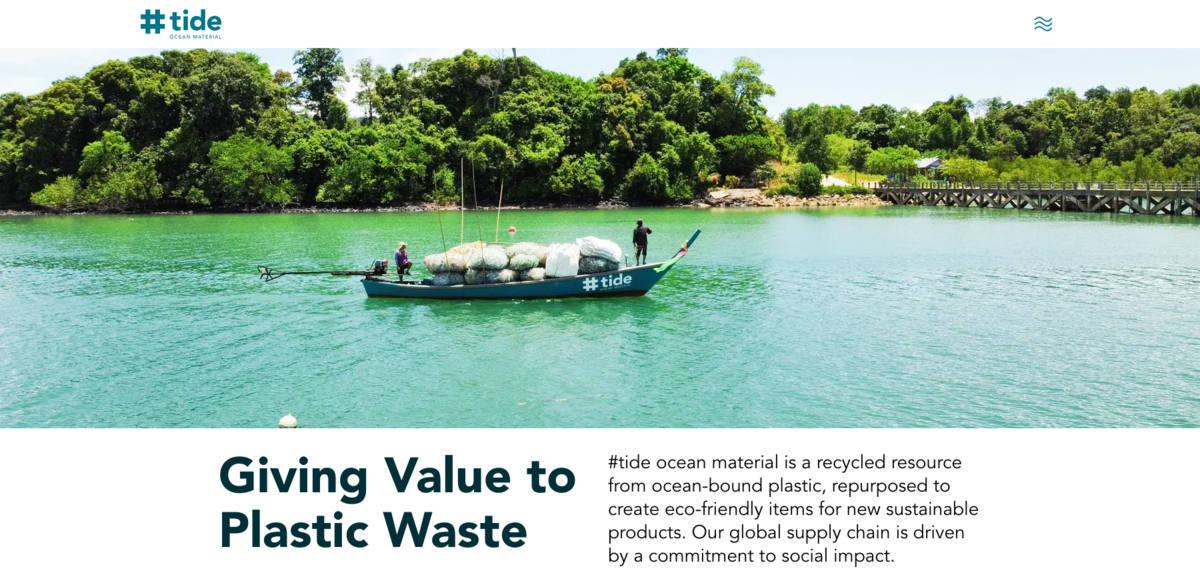What is #TIDE OCEAN MATERIAL?
#tide ocean material® is a groundbreaking recycled resource made from ocean-bound plastic, transformed into eco-friendly materials for new sustainable products. This innovative material comes in various forms: recycled plastic pellets for plastic injection, recycled polyester yarn for textiles, and recycled plastic filament for 3D printing. The project is driven by a global supply chain committed to social impact, working closely with local communities to collect plastic waste and turn it into high-quality, durable goods. From watches to furniture, automotive parts to apparel, and even consumer electronics to sports floors, #tide ocean material® offers endless possibilities for sustainable manufacturing.
Main Benefits of #TIDE OCEAN MATERIAL
Here’s why #tide ocean material® stands out:
- 100% ocean-bound plastic with zero virgin plastic content.
- Up to 80% less CO2 emissions compared to producing virgin plastics.
- Used by over 80 global brands including Migros, Tom Ford, Hugo Boss, and Maurice Lacroix.
- Certified and developed in partnership with the Swiss University of Applied Sciences.
- Supports local communities by paying fair wages to waste pickers and fishermen.
- Offers a wide range of applications from plastic pellets to polyester yarn and canvas.
The Science Behind the Solution
#tide ocean material® is more than just recycled plastic. It’s a scientific solution to plastic pollution. Developed alongside Professor Daniel Schwendemann and his team at the Swiss University of Applied Sciences, the material undergoes a mechanical recycling process that regenerates the molecular chains of ocean-bound plastic. This means the recycled plastic retains its quality and durability, making it perfect for safe, long-lasting products. The process transforms single-use plastic waste into a premium, award-winning material that’s ready for manufacturing across countless industries.
Who is Behind #TIDE?
Tide Ocean SA, a Swiss company with offices in Basel, Lengnau, Ranong, and Hong Kong, is the force behind #tide ocean material®. The project began when Thomas Schori, linked to the Swiss watch industry, explored using recycled polyester yarn for watch straps—a first of its kind. His entrepreneurial spirit led to a collaboration with the Swiss University of Applied Sciences to research ocean plastic damage and develop a premium recycled material. Today, #tide works hand-in-hand with local communities to close the loop on plastic waste, organizing beach clean-ups and building resilient waste management infrastructures.
Applications and Product Range
#tide ocean material® is incredibly versatile. The recycled plastic pellets are perfect for plastic injection molding, used in watches, furniture, automotive parts, electronics, and packaging. Meanwhile, the recycled polyester yarn finds its way into apparel, bags, shoes, and home or office interiors. The material’s excellent properties—density, moldability, durability, lightweight, and resilience—can be tailored through manufacturing processes, making it a favorite for brands aiming for sustainability without compromising quality. Plus, #tide has its own line of OceanProducts like the OceanMug and OceanDomino, showcasing the material’s potential in everyday items.
Impact on Sustainable Development Goals (SDGs)
- SDG 12: Responsible Consumption and Production
- SDG 13: Climate Action
- SDG 14: Life Below Water
- SDG 8: Decent Work and Economic Growth
- SDG 17: Partnerships for the Goals
Transparency and Social Responsibility
Transparency is at the heart of #tide ocean material®’s business model. The company promises to be the most trusted label for recycled ocean-bound plastic, ensuring full traceability and accountability. Beyond environmental benefits, #tide creates social value by supporting fishermen, waste pickers, and retailers involved in the collection and recycling process. Their “Road to 1 Billion Bottles” initiative aims to collect and upcycle one billion plastic bottles, protecting ocean life and fostering a circular economy. This holistic approach not only tackles plastic pollution but also empowers communities and promotes responsible plastic consumption worldwide.


















